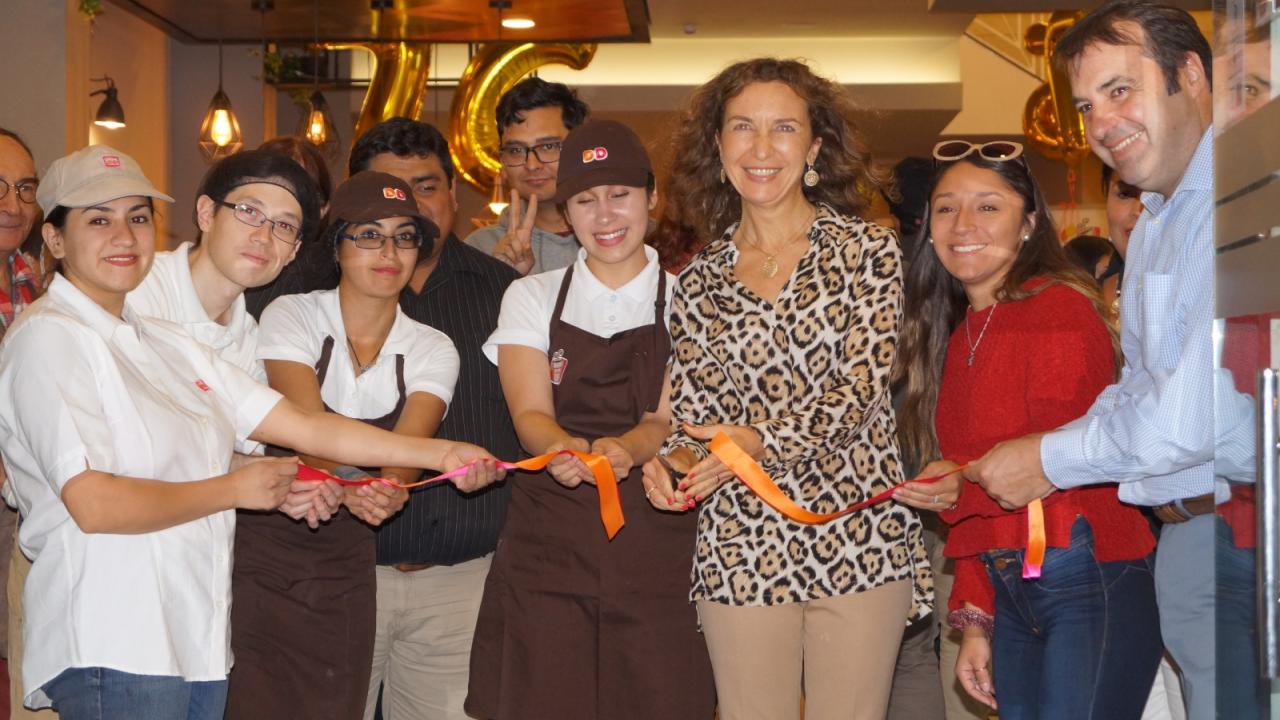
The fast food chain sells three million donuts annually in that country, making it the Latin American nation with the highest consumption of the product. But the estimate is that it still has room to grow, diversifying the menu and store formats, to reach new cities and a larger audience.
Lines from seven in the morning that go around the street to receive the sweet doughs filled with cream and dulce de leche that will be given away for Donut Day demonstrated last June 2 the infatuation of Chileans with this fried bun .
The American chain has been in Chile since 1997, through a master franchise managed by Argentine María Isabel Serrano. In these 26 years, she and her team have opened 113 stores and have not stopped since.
The commercial manager of Dunkin' in Chile bet that the simple combination of coffee and donuts would be as successful as in the United States, where it is the eighth most valued fast food brand, according to the QSR ranking, and the first in its donut category.
Today this product accounts for almost 50% of its sales, followed by drinks, muffins and salty options, such as wraps and salads. The offer today is completed with coffee and fruit smoothies, balancing the global offer with a local flavor.
“We bring many supplies from the United States. In this way we offer in Chile the same donut and the same coffee that is in Boston, Berlin or Abu Dhabi,” says Serrano. “The difference is that the best-selling donut in Chile is the Boston delicacy , which does not exist elsewhere. We created it with that name because the best-selling donut in the world is the Boston cream , but locally the dulce de leche or manjar works better,” he details.
And to reach the vegan world – the donut itself has no animal products, so it is a food that this segment can eat – the company partnered with NotCo to make Notmanjar donuts.
POST- PANDEMIC RE-IMPULSE
The last five years have been busy for the franchise.
Towards 2018 they saw how the brand stopped being Dunkin' Donuts to simply be Dunkin', and in October 2020 they went through the delisting of the brand on the stock market, when Inspire Brands, also owner of the brands Arby's, Buffalo Wild Wings, Jimmy John's and Sonic, bought the company for US$8.8 billion.
And they also suffered the effects of COVID-19 on the business.
“The truth is that in the pandemic we do not suffer as much as other items, in the sense that boxes of 6 and 12 donuts are very suitable for delivery...we developed our own platform for the last mile, but in addition in our application we also work with the big five of delivery,” explains María Isabel Serrano.
Although the lockdown effect was felt in 2020 and 2021, accelerating advertising in digital formats - including influencers - over classic marketing in the media and on public roads, growth resumed in 2022.
”Last year we opened 19 new stores, which marked a record for us and this year we have, between remodeling, relocations and new stores, a total of 21 openings,” explains the manager.
The strategy for this year is twofold: penetration into the cities where they already have stores, especially in the northern part of the country, and on the other hand they will enter the central area in cities where they were not until now, such as Talca and Curicó. “We have an opportunity there, but we continue to grow in Santiago, of course, since it is a tremendous space to grow the brand,” he comments.
Regarding the formats, María Isabel explains that the strategy makes them avoid food courts , or mall food courts. “In general our development is a mix of larger stores, we are looking for drive-through locations, we also have small modules where it is only take away . So the brand has a very flexible format, where the smallest store is 1.2 square meters, but there we also have stores of more than 200 square meters,” he lists.
BIG IN SALES
Like any chain with history, Dunkin' dates back to 1948, when William Rosenberg began serving donuts for five cents and cups of premium coffee for ten cents at the "Open Kettle", located in Quincy, Massachusetts.
Today the company has more than 12,600 restaurants in 46 countries around the world, sells almost three billion donuts and Munchkins annually, and each market it is in is managed independently, either with master franchises or more than one franchise. like the case of Mexico, where there are three independent groups.
The brand is present in Latin America in Peru, Ecuador, Brazil, and Colombia, which is the country with the largest number of stores.
“Chile is the largest country in sales within Latin America for the brand, with a growth of 15% accumulated this year versus last year, so we are really happy. In addition, we are making a large investment in a new plant, which will allow, through more automation, to achieve the volume we need to continue growing and standardize the quality to be offered,” explains Serrano.
While all this is happening, the company is promoting its line of premium donuts that are square and with different fillings and toppings in alliances with brands such as Oreo and Roclekets.
“The sale of these special donuts started with 1% and now exceeds 10%,” says Serrano.
Apparently, the Chilean appetite for donuts is far from over.









